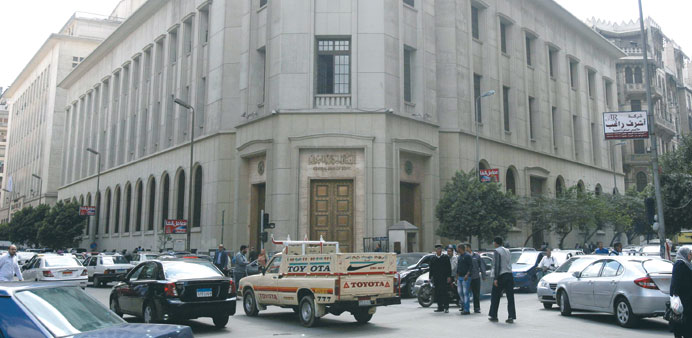Reuters/London/Cairo
Egypt has hit breaking point in its ability to pay for imports of oil, wheat and other basic commodities, forcing it to call in diplomatic favours or seek easy payment terms from suppliers who hope for future advantage in return.
Two years after ousting Hosni Mubarak, new, Islamist leaders are struggling to win a credit line from the IMF as they try to manage the hopes of 84mn people with a depreciating currency and an economy hooked on state subsidies but starved of tourism revenues since the political upheavals began.
Fuel shortages, tighter security at petrol stations and scuffles in the streets are becoming common in Egyptian towns as state importers struggle to meet demand for diesel and gasoline.
Though Egypt’s strategic importance means world powers seem unlikely to let its economy collapse, the credit crisis is now so acute that it can no longer buy crude in the market, leaving its oil minister scrambling to cut diplomatic deals with Libya, Qatar and Iraq, to add to an existing oil lifeline from Kuwait.
Fearing especially the unrest that might follow a shortage of subsidised bread, the government may prioritise fuel for the food industry. Richard Mallinson, an analyst at Energy Aspects in London said: “The focus is probably on ensuring farmers get enough diesel ahead of the harvest season and bakeries don’t run out of fuel as this could trigger food shortage.”
Officials have sought to assuage worries on food, banking on a record wheat crop coming in from next month. But it concedes that fuel supplies are a difficulty:
Elected last June, President Mohamed Mursi has faced sliding currency reserves, a soaring budget deficit and sometimes violent protests. And all the while, Egypt’s choice of suppliers has been eroded as its credit wears thin.
One government official said Cairo was casting around for other sources of commodities, and of finance for them:
“We are now open to other possibilities and our priority will be to serve our country’s interest and seek the country that gives us the best financial facilities and this could also mean that we are opening up to other markets, including Arab states,” the official said.
Egypt currently survives, hand to mouth, with funds arriving from Turkey, Iraq, most recently Libya and, most generously, $5bn in loans from the ambitious Gulf emirate of Qatar.
“It looks like Egypt is running on a Qatari life support machine,” the head of a major international commodities trading house said. “But that cannot last forever.”
Crucial for the future is the $4.8bn deal Egypt is seeking with the International Monetary Fund and a reduction in massive fuel subsidies, which eat up a fifth of state spending.
However, the government fears the domestic backlash subsidy reform would cause and seeks gentler terms.
Egypt is still managing to buy oil products, like diesel, on the market — but lines of tankers waiting to deliver are common at Egyptian ports as sellers wait for delayed payments before offloading.
Compounding its fuel problems, Egypt’s own gas exports have sunk over the last year. The country’s production is falling, due to years of poor investment terms worsened by the crisis.
State gas firm Egas has been in talks since the end of last year to secure natural gas imports from Qatar after agreeing to import Algerian gas in October.
A source familiar with the talks said they are problematic, since Egypt is asking for a price — $4-5 mm Btu — that is less than a third of what Qatar can get today for its gas in Asia.
Egypt is also stretched to supply cheap subsidised bread, industry sources said, while bakers have threatened a strike, seeking overdue state subsidies they put at nearly $60mn.
Egypt is the world’s biggest wheat importer, buying around 10mn tonnes a year, but state purchases since January have fallen to less than a quarter of the same period last year.
Stocks are at dramatically low levels, with a cabinet report on Wednesday showing the country now holds 2.116mn tonnes of the grain from international and local markets, enough to last 85 days.

People and vehicles are seen caught in a traffic jam in front of the Central Bank of Egypt’s headquarters in downtown Cairo (file). Fuel shortages, ti
